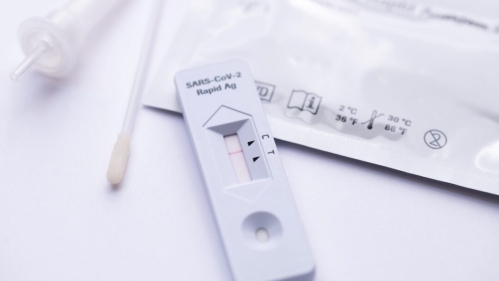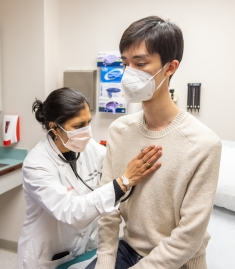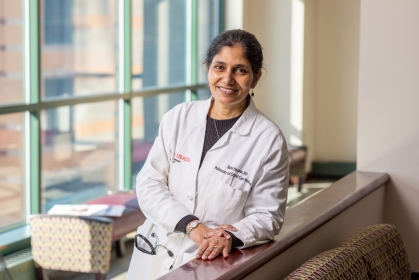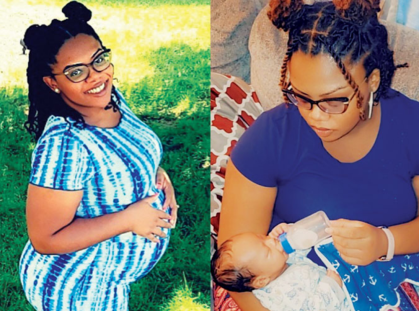
A Publication for Alumni & Friends of Rutgers Robert Wood Johnson Medical School

Post-COVID Recovery Program Is Helping Individuals Get Back on Their Journey to Wellness

In January 2020, months before COVID-19 became a household name, Rutgers student Hina Nadeem was preparing to start the spring semester of her junior year when she contracted a severe flu-like illness that had her extremely short of breath, exhausted, and mentally drained. While she tried to push through it, her symptoms grew worse.
“In the fall, I noticed a really stark difference. As the semester went on, I was getting more and more fatigued. By the end, I wasn’t even able to take my finals normally and had to get accommodations. There was one final where I literally took a nap in the middle because I was not able to do it,” Nadeem recalls.
She took a medical leave of absence from the university, but more than a year after first contracting what her doctors now know was COVID, she was seeing no improvement.
“I was so ill, I was sleeping 20-22 hours a day. I had no physical strength. I was not functioning at all,” says Nadeem, who prior to her illness was a healthy young woman with no pre-existing conditions.
Determined to find a solution, Nadeem’s mother discovered a new program that she hoped would help. The Post-COVID Recovery Program, a joint initiative of Rutgers Robert Wood Johnson Medical School and Robert Wood Johnson University Hospital, provides an array of services to address a wide range of needs for individuals who have been diagnosed with COVID-19. Services include behavioral health; cardiology; cardiac and pulmonary rehabilitation; cognitive assessment and therapy; physical, occupational and speech rehabilitation; nutritional services; and pulmonary/sleep therapy. Additional assistance in cognitive rehabilitation is provided in conjunction with Kessler Institute for Rehabilitation.
The program also helps with non-clinical issues, including financial and social barriers related to recovery—for example, with job searches for individuals who are out of work because of COVID. “They can still qualify for resources and get assistance with issues that have impacted people not just in their health, but in their daily lives,” explains Sabiha Hussain, MD, MPH, associate professor of medicine in the Division of Pulmonary and Critical Care, Department of Medicine, Robert Wood Johnson Medical School, and medical director of the Post-COVID Recovery Program.
“Even if you have mild disease, you can and should be seen for COVID follow-up,” advises Dr. Hussain. “People may not have respiratory symptoms or issues that would alert them to say, ‘Hey, I need to go see a physician,’ but they have other underlying symptoms like fatigue, neurocognitive issues, and depression and anxiety that they don’t understand exactly why it is happening. We screen for all of those things, which helps with overall quality of life.”

Improving Health and Wellbeing
By the time Nadeem connected with the program in 2021, her quality of life had deteriorated significantly. In the year since, the program helped her recover enough to return to Rutgers as a part-time student. She credits the occupational and physical therapists with much of that success.
“When I went for my initial evaluation, I wasn’t even able to speak to my occupational therapist; my mom was telling her all my symptoms because I wasn’t able to put sentences together properly,” Nadeem recalls. “But she worked with me a lot—two to three times a week, hour-long sessions, for more than 10 months, and she got me from not being able to remember even simple things, to going back to class.”
Despite the improvements, Nadeem said she still has a long way to go. And, because of the cognition issues and the numerous therapy and physician appointments—including ones with a subspecialist in Maryland—Nadeem doesn’t foresee returning to full time studies and graduating soon.
“To other people I probably seem normal, but I’m nowhere near where I used to be,” she explains. “There’s only a certain amount of time where I function properly before I get mentally and physically fatigued and I’m not able to continue. I still have cardiac symptoms and neurological and cognition issues that developed because of COVID. I’m constantly in pain. My lung capacity is nowhere near where it used to be. I’m 22 years old. That should not be the case. I should not be having trouble walking down the street. On top of that, I’ve developed POTS, which is very debilitating.”
POTS, or Postural Orthostatic Tachycardia Syndrome, is a form of autonomic nervous system dysfunction often triggered by a viral or bacterial infection, which can damage the nerves regulating blood circulation and blood pressure, and affects all parts of the body. Symptoms can include tachycardia, low and high blood pressure, nausea, vomiting, cognition issues, headaches/migraines, gastrointestinal issues, cold and heat intolerance, dizziness and extreme fatigue, among other neurological issues. The syndrome has been more widespread with the spread of COVID-19 and may be seen in those with long-haul COVID.
“It’s turned my life upside down,” she says.
Like Nadeem, for many patients, COVID-19 is something that shook their lives to the core, says Carol Shu, MSW, LSW, a licensed social worker with the Post-COVID Recovery Program. Besides financial instability and social isolation brought on by the early lockdowns, many patients said they felt like they lost their identity in the middle of the pandemic.
“From bread earners who berated themselves for not being able to return to work, to caretakers who couldn’t accept that they now needed care themselves, to children who need to grow up faster than their peers to care for sick parents…the ripples of this disease go beyond just the physical health,” Shu says.
Expanding Access
Many of the individuals who were most affected by COVID were among the underserved, Dr. Hussain adds.
“We want to make sure that they get the help and resources they need as well, which is why our program also has a social determinants of health component,” says Dr. Hussain. Part of the program’s outreach involves ensuring that underserved communities in the area realize these resources are available. That means addressing language barriers in accessing information, so program materials are translated into Spanish, Russian and Chinese, Dr. Hussain explains. In addition, Dr. Hussain reached out to the New Brunswick Alliance, which she works with in her other social determinants of health-related work, to help spread the word.
“This pandemic brought topics such as the lack of a social safety net, the barriers preventing access to affordable healthcare, and the trauma of chronic illness to the forefront,” notes Shu. “Our program understands the importance of these social determinants of health and incorporates them into patients’ treatment plans. As a result, the program is more than just about what illnesses the patients physically have. It is about showing patients there are people who care for them and who are able to still see them as a fellow human and not the embodiment of a pandemic—that they are not alone.”
This shared experience resonates with Alicia Thompson-Overby, who was diagnosed with COVID when she was 33 weeks along in a healthy pregnancy. Her condition deteriorated so rapidly that she was forced to have an emergency C-section five days later to save her life and her baby’s.

While still traumatized by that experience, Thompson-Overby continued to struggle with health and cognitive issues at home. Her son was 6 months old before she was able to stop using a walker consistently, and she was still experiencing forgetfulness and concentration issues, head-aches, joint and muscle pain, and shortness of breath. But the biggest issue, she says, was the extreme fatigue: “It’s very hard to be tired when you have an infant and a toddler to take care of. I’m tired all day and could sleep whenever, if I could. But I don’t have the luxury of doing that.”
Having people who understand that situation is a bonus, she says: “When I go to occupational therapy, I may not know the other patients, but a lot of them are going through the exact same thing as me, so being able to talk to other people who have similar issues is really helpful.”
She also appreciates having access to a social worker who can “piece together all the broken pieces” and has access to her whole team of doctors.
Thompson-Overby continued to have approximately three to five doctor’s appointments weekly but attributes her progress thus far to her post-COVID recovery team of doctors. She also takes comfort in regular follow-up appointments and the team that is helping deal with long-haul COVID effects.
“Realizing that these symptoms don’t just go away overnight for everybody and knowing that I’m still under the care of a team that is updated and knows what’s going on is a relief,” she says. “I was confused about whether something was going on with me post-partum, or whether it could be post-COVID. But talking to the doctors and having them explain that I might have muscle weakness, joint pain, headaches—that a lot of the things I’ve been experiencing even still, like the shortness of breath and the tiredness, are all signs of long-haul COVID has been very helpful.”
Although she had not yet been able to return to her career as a speech-language pathologist, Thompson-Overby says she has been taking advantage of what she learned in her own cognitive rehabilitation to help address issues her future patients may have with executive functioning skills—“I’m thinking, ‘how can I return to work and help people who are experiencing the same things that I might need help with right now?’ I’m really motivated, and anything that I can do to either stay well or continue on a journey to wellness is what I’m trying to do right now.”
In addition, being well acquainted with the problems of systemic racism in healthcare and knowing the startling statistics on maternal mortality for Black women, regardless of prenatal care or socioeconomic status, Thompson-Overby is committed to advocating for others like herself and raising awareness of the issue.
Initially launched on Jan. 8, 2021, the Post-COVID Recovery Program treated 300 patients in its first year and typically sees 15-17 people in its weekly Monday clinics. It can be reached by calling 732-235-7840.
Finding Answers: The Bigger Picture
In addition to its clinical efforts, the Post-COVID Recovery Program is helping advance knowledge about long-term COVID in relation to those who do not experience COVID’s lingering effects.
“We really want all people who have had COVID in the program, so we can compare and contrast—to see the difference between patients who end up having long-term COVID versus people who don’t. Is their bloodwork different? Is their overall trajectory much different than long-term COVID patients?” Dr. Hussain says.
Program researchers are conducting a number of different studies to help find answers to these and other questions. For example, Dr. Hussain says, they are exploring immune response, analyzing the differences in patients’ B and T cells, and conducting studies involving exercise and ongoing shortness of breath in individuals with mild COVID.
The team also is working with William T. Hu, MD, PhD, associate professor and chief of cognitive neurology at Rutgers Robert Wood Johnson Medical School and Rutgers Institute for Health, Health Care Policy, and Aging Research, on studies involving issues of post-COVID cognitive impairment following mild-to-moderate COVID.
“Neurocognitive consequences of post-COVID syndrome affect the daily life of 62 percent of our patients,” says Dr. Hussain.
The ultimate goal of the research efforts, she says, is to further characterize long-term COVID and, using this new understanding of its pathology, uncover potential treatments to lessen impact or prevent its occurrence.
